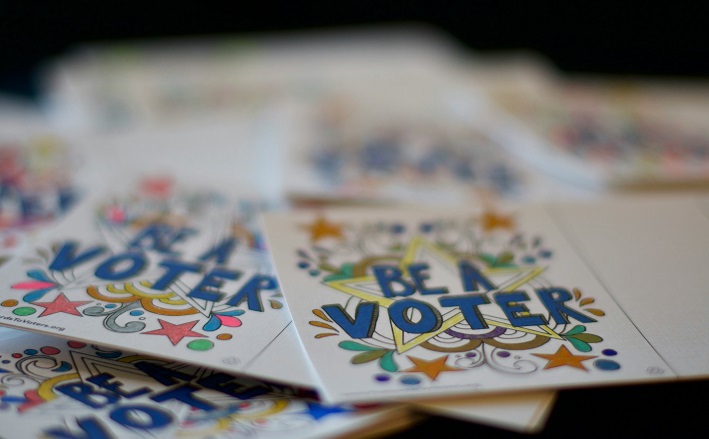In an election year,1 the challenge of preaching to voters and nonvoters alike is real.
Election-year leadership includes planning for the ways that faith communities can encourage participation in the electoral process as an act of discipleship. When the opportunity arises through texts, this can include attention to the faith-rooted values that support and encourage civic life. In every congregation, we can anticipate that our hearers will include committed regular voters, intermittent voters, those who do not vote and those who may face barriers to casting a ballot. Speaking to all groups together about election engagement as an act of discipleship can reframe voting from an individual act to something we do together as a community.
First, know the law
Preaching and congregational leadership in an election year means knowing the law, particularly in the United States, the IRS provision2 that churches and 501(c)(3) organizations are prohibited from “directly or indirectly participating in, or intervening in, any political campaign on behalf of (or in opposition to) any candidate for elective public office.” Many denominations, including my own,3 provide guidance and resources to support compliance in nonpartisan election year participation.
Congregations include voters and nonvoters
A common misconception is that the same nonvoters always opt out due to apathy, disengagement, or disenchantment with the electoral system. In fact, while most Americans cast ballots in the last several elections, the same individuals did not vote consistently. About two-thirds (70%) of U.S. adult citizens eligible to participate turned out in the last three national elections, but only about half (37%) voted in all three.4 Demographic factors, including age, race, location and education, may be indicators of likely voting activity and invite specific appeals or support for voting. In every context, most congregations probably have a mix of people who always vote, never vote and those who vote intermittently. In preaching we speak to all three groups as a community by encouraging everyone, particularly those on the fence, to root civic engagement in understandings of God, discipleship, vocation and Christian hope.
Faith values of love, community, justice, and hope undergird election engagement
A sermon can provide opportunities to speak about the importance of voting to listeners who may not be intending or inclined to go to the polls. Texts that lend themselves to this task express biblical and faith-rooted values that emphasize life together, including neighbor love, community, God’s call to do justice and hope for the future.
- When we vote we are participating in God’s work. God neither controls political events nor is absent from them. Instead, God works through government and leaders to provide for our needs as a society. When we vote, volunteer at the polls or advocate for voting rights, we are expressing our confidence that God is present in all realms of life, even in politics. Our vote recognizes that there is no place where God is not active and working—and we are invited to participate!
- Voting is one way to love our neighbors. God’s love for us overflows into our love of neighbors, near and far. Congregations express this love in many kinds of services, from meeting local needs for food and shelter to supporting sustainable development globally. Voting serves our neighbors through adding our voices at the ballot box and casting thoughtful votes for the candidates and policies that best represent the kind of community and world we seek. Our neighbor love includes consideration of the well-being of people not eligible to vote.
- Voting is something we do together as a community. Voting is a communal activity that invites our participation as citizens and as disciples. In our civic life, voting is a shared responsibility that binds us together. We further community life and human connections when we identify ways to help one another make a plan to vote, remembering outreach to first time voters. The Virginia Interfaith Center for Public Policy invites congregations to make a “100% voting congregation” pledge5 and find ways to support participation. Congregations can bless those working the polls or conducting registration drives. You can even include those who do not yet vote, for example with this Intergenerational Conversation Starter6 to share stories of voting as an act of faith—shared between generations!
- Voting is an expression of hope—voting is future-oriented. We weigh campaign promises and platforms to make our choices in service of a future that aligns with our values and striving for justice and peace. Faith is also expressed in the language of hope. Therefore, a vote is not the end but a beginning, and an invitation to continued participation in political processes through advocacy and regular communication with elected officials.
Identify and reduce barriers to voting
Christian education that encourages civic participation can also identify and work to lower barriers to voting in your community. The U.S. has a long history of disenfranchisement and voter suppression. Methods include voter ID requirements, voting roll purges, lack of language access, reduction of voting hours or locations, and more. These measures often have a disproportionate impact on minority communities. Consider how the congregation can act to reduce barriers, reach out to nonpartisan election groups to learn from their expertise, share reliable election information, offer rides to the polls, conduct voter registration, serve as poll watchers and more. A tool such as this Prepared to Vote checklist7 can help you customize information for your community.
[See part 2 in the series: “Preaching and Political Polarization“]
Notes
- The United States is one of many democratic countries that are conducting elections in 2024. See Jill Lawless, “Over 50 countries go to the polls in 2024. The year will test even the most robust democracies,” Associated Press. January 10, 2024.
- See IRS website article, “The Restriction of Political Campaign Intervention by Section 501(c)(3) Tax-Exempt Organizations.” Updated May 2024.
- Download the Evangelical Lutheran Church in America (ELCA) PDF: “ELCA Civic Engagement Guide.”
- Pew Research report, “Voter Turnout in US Elections, 2018-2022,” July 2023.
- Virginia Interfaith Center article, “100 Percent Voting Congregations.”
- Evangelical Lutheran Church in America PDF “Intergenerational Conversation Starter.”
- Evangelical Lutheran Church in America PDF, “Prepared to Vote Checklist.”

